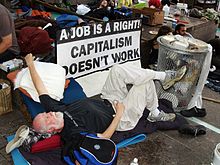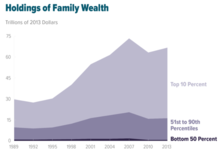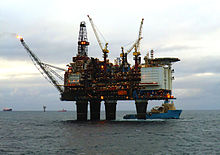Criticism of capitalism
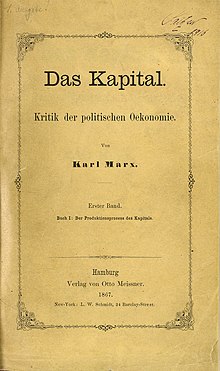
Criticism of capitalism is a critique of political economy that involves the rejection of, or dissatisfaction with the economic system of capitalism and its outcomes. Criticisms typically range from expressing disagreement with particular aspects or outcomes of capitalism to rejecting the principles of the capitalist system in its entirety.[1]
Criticism of capitalism comes from various political and philosophical approaches, including
Prominent among critiques of capitalism are accusations that capitalism is inherently
History
Early critics of capitalism, such as
Criticism by different schools of thought
Anarchism
French anarchist Pierre-Joseph Proudhon opposed government privilege that protects capitalist, banking and land interests and the accumulation or acquisition of property (and any form of coercion that led to it) which he believed hampers competition and keeps wealth in the hands of the few. The Spanish individualist anarchist Miguel Giménez Igualada sees "capitalism is an effect of government; the disappearance of government means capitalism falls from its pedestal vertiginously ... That which we call capitalism is not something else but a product of the State, within which the only thing that is being pushed forward is profit, good or badly acquired. And so to fight against capitalism is a pointless task, since be it State capitalism or Enterprise capitalism, as long as Government exists, exploiting capital will exist. The fight, but of consciousness, is against the State".[4]
Within anarchism, there emerged a critique of
Libertarian socialists believe if freedom is valued, then society must work towards a system in which individuals have the power to decide economic issues along with political issues. Libertarian socialists seek to replace unjustified authority with direct democracy, voluntary federation and popular autonomy in all aspects of life,[10] including physical communities and economic enterprises. With the advent of the Industrial Revolution, thinkers such as Proudhon and Marx elaborated the comparison between wage labor and slavery in the context of a critique of societal property not intended for active personal use,[11] Luddites emphasized the dehumanization brought about by machines while later Emma Goldman famously denounced wage slavery by saying: "The only difference is that you are hired slaves instead of block slaves".[12] American anarchist Emma Goldman believed that the economic system of capitalism was incompatible with human liberty. "The only demand that property recognizes", she wrote in Anarchism and Other Essays, "is its own gluttonous appetite for greater wealth, because wealth means power; the power to subdue, to crush, to exploit, the power to enslave, to outrage, to degrade".[13] She also argued that capitalism dehumanized workers, "turning the producer into a mere particle of a machine, with less will and decision than his master of steel and iron".[14]
Noam Chomsky contends that there is little moral difference between chattel slavery and renting one's self to an owner or "wage slavery". He feels that it is an attack on personal integrity that undermines individual freedom. He holds that workers should own and control their workplace.[15] Many libertarian socialists argue that large-scale voluntary associations should manage industrial manufacture while workers retain rights to the individual products of their labor.[16] As such, they see a distinction between the concepts of "private property" and "personal possession". Whereas "private property" grants an individual exclusive control over a thing whether it is in use or not and regardless of its productive capacity, "possession" grants no rights to things that are not in use.[17]
In addition to anarchist
Carson coined the pejorative term "vulgar libertarianism", a phrase that describes the use of a free market rhetoric in defense of corporate capitalism and economic inequality. According to Carson, the term is derived from the phrase "vulgar political economy", which Karl Marx described as an economic order that "deliberately becomes increasingly apologetic and makes strenuous attempts to talk out of existence the ideas which contain the contradictions [existing in economic life]".[22]
Conservatism and traditionalism
In Conservatives Against Capitalism, Peter Kolozi relies on Norberto Bobbio's definition of right and left, dividing the two camps according to their preference for equality or hierarchy. Kolozi argued that capitalism has faced persistent criticism from the right since the beginning of the Industrial Revolution. Such critics, while heterogeneous, are united in the belief “that laissez-faire capitalism has undermined an established social hierarchy governed by the virtuous or excellent".[23]
In September 2018, Murtaza Hussain wrote in The Intercept about "Conservatives Against Capitalism", stating:
For all their differences, there is one key aspect of the intellectual history charted in "Conservatives Against Capitalism" that deals with an issue of shared concern on both the left and the right: the need for community. One of the grim consequences of the Social Darwinian pressures unleashed by free-market capitalism has been the destruction of networks of community, family, and professional associations in developed societies. ... These so-called intermediate institutions have historically played a vital role giving ordinary people a sense of meaning and protecting them from the structural violence of the state and the market. Their loss has led to the creation of a huge class of atomized and lonely people, cut adrift from traditional sources of support and left alone to contend with the power of impersonal economic forces.[24]
In June 2023, Bridget Ryder wrote in The European Conservative about the degrowth movement, stating:[25]
The capitalist-critical conservative, however, sees possibilities for technological progress and personal freedoms that lie beyond market-driven economics, finding inspiration in European traditions that have been supplanted by industrialisation. Despite the gains in efficiency made within capitalism, many conservatives remain sceptical of the possibility of endless economic growth, particularly given that God is infinite and his creatures, including petroleum and other minerals, are not.
Fascism
Fascists opposed both
Liberalism
During the Age of Enlightenment, some proponents of liberalism were critics of wage slavery.[31][32]
Marxism
| Part of a series on | |||||||||||||||||||||||||||
| Marxian economics | |||||||||||||||||||||||||||
|---|---|---|---|---|---|---|---|---|---|---|---|---|---|---|---|---|---|---|---|---|---|---|---|---|---|---|---|
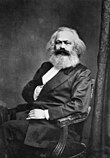 | |||||||||||||||||||||||||||
|




